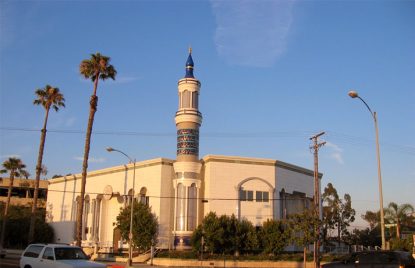
There are some areas of study that are great for putting it all in perspective. Astronomy reminds you that we are that ‘pale blue dot’ all the way in the background. Zoology reflects the fact that we are just one species out of many inhabiting the planet. History though, history is really my favorite thing to read (or watch) right now; this is not the first plague to hit humanity, and what we did the last time is more than interesting. It’s probably life saving. And because the history of our civilization is also a history of religions, it’s kind of a two-for-one thing.
While I often read the word ‘Islamophobia’ in news coverage, Islamophilia is a word that’s kind of rare. There is a lot to love about Islam, particularly in the moment when we are so conscious of hand washing and face covering. Many of the things we are doing to protect ourselves and our loved ones from the novel coronavirus are things that Muslims have been practicing on a daily basis for centuries.
There is wisdom to be found in every faith.
The King Fahad Mosque on Washington has recently been in a bit of a back and forth about the ‘call to prayer’ being broadcast from the minaret. For the for first time in more than a decade, on May 16, 2020, a muezzin sang on Friday evening. The sound of the prayer going out of the neighborhood was sweet to some, not sweet to others. A complaint to the city seemed as if it would halt the prayer, but then a number of people in the community asked the city to allow it to continue. Tonight, we expect there will be a muezzin singing at sunset.
History is said to be “news that stays news.”
I was recently drawn into studying “La Convivencia”, the period of the middle ages in Spain where the Northern Catholic kingdoms shared borders with the Southern Islamic kingdoms. The Islamic kingdoms had an official policy of ‘coexistence’ that allowed Christians and Jews to live under the Muslim rulers. While intolerance was the rule through most of the world, well into the 19th century, this policy allowed the population a diversity of beliefs. It wasn’t equality, mind you – Jews and Christian paid an extra tax, and were not allowed to serve in some government jobs. But it gave southern Spain a few hundred years of real cultural mixing, and it was part of what is looked back on as a ‘golden age.’
When people from the northern kingdoms traveled south, they had the eye opening experience of coming into cities that were clean, beautifully designed and even smelled lovely. This was when most Christians believed that bathing caused illness, and rarely changed their clothes more than seasonally. Surely some of those travelers brought back a habit of washing their hands. They might even have been among the people who survived the black plague.
We have one of the most notable mosques in Southern California sitting right on Washington Blvd., many of us don’t know much about Islam. Allowing the call to prayer is a lovely nod to our own need for ‘convivencia.’ Savoring the sound of a song, even if you don’t understand the words, is one of those things about being human that leads us away from fear, and closer to love.
Judith Martin-Straw


I can understand why gathering in person might be prohibited, but not the Muslim call to prayer . Those living nearby should feel honored to hear the call. I don’t believe the sound is objectionable. I believe that the naysayers are racist islamqaphontbes who should not have their warped point of view prevail in Culver Ciy.